Short on time in Dublin? Here’s what you must do and see if you need to explore Dublin in a day.
The Dublin of today is one that has recovered from centuries of political and economic repression and Dubliners are increasingly keen on reclaiming Irish culture before it’s lost for good. As a result, Irish song and dance can be found all over the city pretty much any night of the week. Lucky for tourists who are short on time to Dublin, this makes it easier to both see the sights of the city and experience the culture. Here is what to see during your one day in Dublin to make sure you view the top sights while experiencing Dublin’s vibrant and fun culture.
Besides what to do in Dublin, this itinerary guide also includes tips on what to pack, where to sleep, and where to eat.
Top 10 Best Things to Do in Dublin
Let’s start with the 10 best things I recommend seeing if you can make time for it during your trip to Dublin. You should have time for most of these if you follow my Dublin 1-day itinerary.
One Day Tip: You’ll likely want to choose between Guinness Storehouse vs. Old Jameson Distillery, and Dublin Castle vs. Little Museum of Dublin to maximize time.
- Dublin Castle: A former fortress that now houses old ruins, museums, and gardens.
- Guinness Storehouse: Learn how Ireland’s beloved Guinness beer is brewed.
- Trinity College and Book of Kells: Ireland’s oldest university which is home to the 8th century Book of Kells.
- Temple Bar: An old neighborhood that is now home to Dublin’s most vibrant nightlife.
- Irish Dance and Music: Take in the unique and exciting world of Irish dance and music at a pub or theater.
- Dublin City Hall: The first Irish government was housed here and its rotunda is ripe with symbolism.
- Christ Church Cathedral: A historic church that has an impressive crypt museum.
- Old Jameson Distillery: Learn how Jameson whisky is made and tour its old distillery.
- St. Stephen’s Green: A pretty Victorian park in the middle of the city center.
- Little Museum of Dublin: A museum of artifacts donated by the people of Ireland.
Trinity College: A Historic University Housing the Famous Book of Kells
Trinity College is Ireland’s oldest university and is a neatly situated complex of impressive 18th and 19th century buildings. The university was started during the English reign of Elizabeth IV and is built on the remains of a 13th century monastery.
Graduates of Trinity College include Samuel Beckett, Jonathon Swift, and Oscar Wilde – all of whom were part of the Church of England.
While the grounds of Trinity College are pleasant to walk around to admire the architecture and landscape, the main draw of Trinity College is inside its Old Library: the Book of Kells. The Book of Kells is from the 8th century and is elaborately illuminated in Trinity College’s Old Library.
The Book of Kells includes beautiful pages of Irish monastic art and is set up in order to give visitors a historical perspective and understanding of the book.
Trinity College Quick Facts
Address: College Green
Tram: St. Stephen’s Green (Green Line)
Phone: 353 1 896 1000
Hours: The grounds of Trinity College are open all day every day. The Old Library and Book of Kells has its own hours: Monday – Saturday, 9:30 a.m. – 5 p.m.; Sunday (October – April), 12 p.m. – 4:30 p.m.; Sunday (May – September), 9:30 a.m. – 4:30 p.m.
Cost: Free to walk around the grounds. Admission to the Old Library and Book of Kells is €9 for adults and €8 for students. Children under 12 are free.
One Day Tip: Focus on the Book of Kells during your time in Trinity College and save the other areas of Trinity College (which are home to some art galleries and museums) for another day in Dublin.
Irish Houses of Parliament & Bank of Ireland
Across from the main entrance to Trinity College along College Green street is the old 18th century Irish Houses of Parliament. Today, the building houses a bank, but originally the building was full of nobles who had the British monarch’s money to make laws, ultimately leading these laws to not always be the most fair. The nobles built the Parliament building to help the economy of Dublin look prosperous.
The Parliament consisted of a House of Commons and House of Lords and members of the Parliament had to be landowners who were part of the Church of England.
The old Parliament signified wealth and privilege in the hands of the few and based on church affiliation. Because of that, it is a good building to take a look at as it was an important part of Ireland’s history until the end of the 18th century when this Parliament was abolished due to England’s desire to have all government representatives based in London.
While at the old Parliament, look for the statue of a lady with a harp, a representation of Irish symbolism across from the English imperialism crest.
Dublin Castle: An Introduction to Old Dublin
Dublin Castle is located in the oldest part of Dublin and was a fortified place to house the monarchy in Ireland during the 19th century, though the British monarchy hardly ever visited it. It’s important to note that Dublin Castle is not really a castle anymore. Most of it was destroyed by a fire in the late 1600s and as Dublin didn’t need a fortified castle anymore (Ireland was already securely conquered at the time), Dublin Castle was rebuilt with non-fancy office buildings.
Today, there is just a remnant of the original fortification, but within it some of Dublin Castle’s previous grandeur remains and it houses some museums as well as the ancient remains of a Viking fort. Another interesting element to this site is behind Dublin Castle in the garden, which is assumed to have once been a pool as Dublin’s name means Black Pool (dubh linn in Gaelic).
While at Dublin Castle, look for the untraditional Statue of Lady Justice — she is not blindfolded and is looking in toward the castle with her back toward town.
History buffs will also enjoy visiting Dublin Castle due to the square of the upper part of the castle being the location where Michael Collins came to ceremoniously take the keys to Ireland, after which the British flag came down and British troops rapidly left.
Dublin City Hall: Frescoed Magnificence and Governmental Significance
Dublin City Hall is a Georgian building that has a prominent place in Dublin’s history as the first victims of the Easter Rising happened around this building. It’s also where the first Irish government was housed.
Walk inside Dublin City Hall to see the impressive floor décor. The crest of the city is in the center of the rotunda along with images of the scales of justice and a sword for the law. There are also crests drawn to represent the west, south, and north of Ireland. (No east since Dublin is in the east.) The paintings on the wall surrounding the rotunda depict scenes from the city.
Christ Church Cathedral: Part of the Church of Ireland with a Historic Crypt
Christ Church Cathedral is part of the Church of Ireland. It is located at one of the highest points of the city. The church building was originally built by the Normans, but most of its construction and architecture is from the 19th century. Its ancient history is still prominent though as the Viking era of Dublin is located beneath Christ Church. In the 1970s, two million artifacts from the Vikings were taken out of ground under and around Christ Church Cathedral. Some of what was found can be seen in the Cathedral crypt. Below the nave is where you’ll find the Christ Church Cathedral Crypt, which houses a dimly lit museum with illuminated artifacts from the treasury and church plus religious statues and perhaps the most random but interesting item – a mummified cat and rat found in the church organ in the 1860s.
One More Cathedral Option for Your Itinerary: St. Patrick’s Cathedral
If you really love religious history or cathedral architecture, try to squeeze in a visit to St. Patrick’s Cathedral, too.
St. Patrick’s Cathedral in Dublin is a magnificent structure that is well worth a visit for anyone interested in history, architecture, or religion. The cathedral features high vaulted ceilings, intricate stained glass windows, and ornate carvings.
One of the most interesting things about St. Patrick’s Cathedral is its long history. The cathedral has been a place of worship for over 800 years, and has seen its fair share of ups and downs over that time. From wars and fires to periods of neglect and disrepair, the cathedral has survived it all and emerged as a symbol of resilience and strength.
St. Stephen’s Green: Green Space within Dublin’s City Center
St. Stephen’s Green is a pretty, leafy Victorian park in the center of Dublin. It has been a public park since 1880 and is 22 acres. St. Stephen’s Green has fountains, flowers, lakes, a waterfall, and peaceful walking trails. The park is adjacent to Grafton Street and also close to Trinity College and other top Dublin sites, making it a good break point from sightseeing during your day in Dublin.
While walking around St. Stephen’s Green you’ll see sculptures of Henry Moore, James Joyce, Robert Emmet, and other figures from Irish history. There are also numerous memorials in St. Stephen’s Green, including one for the Great Famine as well as one in honor of the respected Irish writer and poet William Butler Yeats. At the Fusiliers’ Arch entrance you can also still see bullet marks from the Easter Rising.
Little Museum of Dublin: A Little Bit of Everything from Dublin’s History
The Little Museum of Dublin is an excellent way to learn about Dublin’s varied history. Located in an elegant Georgian townhome near St. Stephen’s Green, the Little Museum of Dublin takes up just a few rooms, but packs in historical significance.
The artifacts and memorabilia in the Little Museum of Dublin are all donated by the Irish people. From old advertising posters to the podium President Kennedy used when on a visit to Dublin, you’ll find lots of treasures in the Little Museum of Dublin.
So colorful is the history of many of the articles in the museum, that you’ll want to hear about them first hand; the best way to do that is to take a tour while at the Little Museum of Dublin, which is offered every hour on the hour and is included in the price of admission.
Little Museum of Dublin Quick Facts
Address: 15 St. Stephen’s Green
Tram: St. Stephen’s Green (Green Line)
Phone: 353 1 661 1000
Hours: Open Daily,10:30 a.m. – 6 p.m.
Cost: Adults: €7; Senior Citizens: €5.50; Students and Children under 18: €4.50; Family (2 adults and 3 children): €14; Children under 3: Free (Save 25% if you buy your ticket online at www.littlemuseum.ie)
One Day Tip: If you do one museum in Dublin, do this one and don’t miss the guided tour. Its different setup and the knowledgeable guides will keep this museum standing out in your travel memory.
Shop and Eat Along Grafton Street
Grafton Street is one of the most famous and beloved streets in Dublin. It is a pedestrianized street, located in the heart of the city’s commercial district, and is known for its vibrant atmosphere, street performers, and wide variety of shops and restaurants.
One of the main draws of Grafton Street is its fantastic shopping options. The street is home to a number of high-end retailers, including Brown Thomas, Louis Vuitton, and Tiffany & Co, as well as more affordable options like H&M and Topshop. There are also a number of independent boutiques and shops, selling everything from handmade jewelry to vintage clothing.
But Grafton Street isn’t just about shopping – it is also a great place to grab a bite to eat. There are countless cafes, restaurants, and bars lining the street, serving everything from traditional Irish fare to international cuisine. Whether you’re in the mood for a quick coffee or a leisurely meal, you’re sure to find something to suit your tastes on Grafton Street.
Beyond its shopping and dining options, Grafton Street is also a place of cultural and historic significance in Dublin. The street has been a hub of activity for centuries, and has played host to a number of important events over the years, including political rallies, protests, and performances by famous musicians and artists.
One of my best friends is from Ireland and I love hearing her stories about spending part of Christmas on Grafton Street watching buskers perform, who are often joined by famous Irish musicians.
O’Connell Street and the Spire of Dublin
O’Connell Street is another famous street to check out during your day in Dublin. It is a vibrant and bustling street that is filled with Irish history, culture and entertainment. Visitors to the city will find a wealth of things to see and do on this iconic street.
One of the most notable landmarks on O’Connell Street is the Spire of Dublin. This towering structure is over 120 meters tall and serves as a symbol of modern Ireland. Visitors can take a stroll down the street and marvel at the Spire’s impressive height and design.
Another must-see attraction on the street is the General Post Office. This historic building played a pivotal role in the Easter Rising of 1916 and is now a museum that offers visitors a glimpse into Ireland’s past.
Aside from the historical landmarks, O’Connell Street is also home to a variety of shops, restaurants, and bars. Visitors can indulge in traditional Irish cuisine, sample local beers and enjoy live music performances.
Guinness Storehouse: More than Just a Pint
Even non-beer drinkers are intrigued by the layout and information found within the walls of the Guinness Storehouse. And if you’re only going to try Guinness once in your life, it may as well be from where it originates.
Guinness is an Irish Stout made from water, barley, hops, and yeast – four ingredients expertly mixed together according to a secret recipe. The Guinness Storehouse is set up to focus on each of these ingredients and the process of making the beloved Irish beer.
After touring the Storehouse and learning about the four main ingredients of Guinness, the history of the company and how the company used to advertise, you’ll culminate your experience at the Gravity Bar on the top floor of the Guinness Storehouse. The Gravity Bar is a circular room with floor to ceiling windows that offers excellent views of the Dublin cityscape and you can get a perfectly poured pint of Guinness there to enjoy.
Old Jameson Distillery: Learn the Art of Irish Whiskey
If whiskey is more your thing than beer then end your one day in Dublin by heading to the Old Jameson Distillery instead of the Guinness Storehouse. The Old Jameson Distillery tour is an hour long (last tour starts at 5:30 p.m.) and begins with an audio and visual presentation.
The second part of the tour is a guided portion that walks you through the seven stages of whiskey production. Your guide will go over the combination of malted barley and unmalted barley that gives Jameson Whiskey its much loved taste. In addition, you’ll learn what makes Irish whiskey different from Scotch and American whiskey.
During the third part of the tour, you’ll have the chance to put this knowledge to work if you so desire as the third portion involves comparative tasting of Irish, Scotch, and American Whiskey.
With each guided tour, only a select number of volunteers get to do the tasting; however, everyone gets the distillery’s signature drink, which is Jameson Whiskey with ginger ale and lime. If you don’t have the chance to do a comparative tasting during the tour, but want to do one after watching it, you can purchase a comparative tasting sampler at the onsite Jameson bar after the tour.
Temple Bar: More History and More Beer
After the sun goes down, head to the Temple Bar district of Dublin. Despite its reputation today for having a great nightlife, the name for Temple Bar actually has nothing to do with drinking establishments. The word “Temple” in Temple Bar refers to the family who owned the area while “Bar” actually refers to an old wall in front of the River Liffey.
The Temple Bar neighborhood was originally home to grain warehouses and stately houses and was quite prosperous before falling on hard times after Parliament was relocated to England in the early 1800s. These departing aristocrats took the bulk of the economy with them, including the sea trade, which had once made the Temple Bar neighborhood so prosperous. Abandoned aristocratic houses that originally housed one family ended up housing a dozen or more families.
Temple Bar is now back to being prosperous, though this time it’s due to the many revelers who descend onto its many bars each evening for some fun and debauchery as Temple Bar is the place in Dublin to be at night due to the many lively bars and pubs that line its streets.
Find a pub offering live traditional Irish music to spend your night listening to. Or go to the aptly named Temple Bar establishment for a quintessential night out in the area.
One Day Tip: If you have other nightlife plans in Dublin, head to the Temple Bar area after leaving Trinity College and the Old House of Parliament. It has a different vibe (and is substantially less crowded) during the day of course, but it’s still neat to walk around this colorful neighborhood for a bit and maybe even get a coffee or snack before heading to the next place on your Dublin itinerary.
Temple Bar Quick Facts
Address: Temple Bar, south bank of River Liffey between Temple Lane South and Aston Place.
Tram: Jervis (Red Line)
Hours: Area accessible 24 hours a day. Bars typically close at 2:30 a.m. on the weekends and 1 a.m. during the week.
Cost: Free to walk around. Some bars and pubs may have late night cover charges to get in.
Where to Sleep in Dublin
If short on time, do yourself a favor and stay right in the city center of Dublin. It makes it so much easier to see the main sites of Dublin and gives you easy access to some of the most popular nightlife spots in Dublin at which to end your day. Do yourself another favor and book yourself into the Fitzwilliam Hotel.
After two visits spent outside the city center, my last stay in Dublin was at the Fitzwilliam Hotel and I was delighted with how fast it was to get to everything I wanted to see. Located right next to both Grafton Street and St. Stephen’s Green, the Fitzwilliam Hotel is ideally located and even has rooms with balconies overlooking the treetops of St. Stephen’s Green.
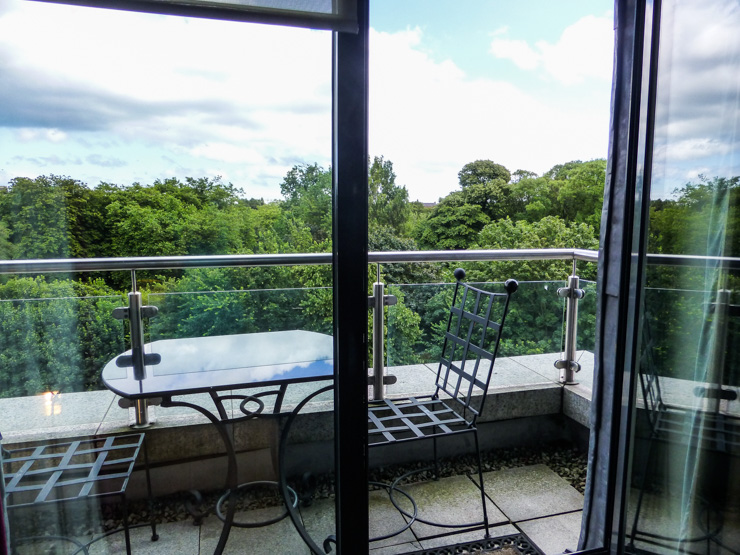
Inside the luxury hotel you’ll find well-appointed rooms with bright colors (a plus in often rainy Dublin), top-notch service, and amenities such as an onsite bar lounge and restaurants, a spa, and a helpful concierge desk.
Fitzwilliam Hotel is also home to a restaurant called Glovers Alley that is on the second floor and overlooks St. Stephen’s Green.
Afternoon tea at Inn on the Green (the bar/lounge in the hotel) was also a lot of fun to do during my stay at Fitzwilliam Hotel. Our server explained this wasn’t the traditional type of tea we might be used to — it did have scones (which were delicious!) but most of the other items were culinarily creative, like tuna tartare with avocado in a sesame cone and a langoustine and truffle wonton with lemon aioli.
As for drinks, the tea selection was quite extensive and the experience ended with a cocktail. I chose the yummy cucumber cup cocktail made with gin, elderflower liqueur and muddled cucumber.
Where to Eat in Dublin
In addition to the above mentioned restaurants at Fitzwilliam Hotel, I had some other delicious and memorable meals in Dublin.
Dinner at Brazen Head, the Oldest Pub in Dublin
Eat some delicious fish and chips alongside a pint of Irish beer at Brazen Head, also known as the oldest pub in Dublin. Brazen Head often has live Irish music, as it did the night we were there. The charming patio and old-fashioned interior added to the historic ambiance.
The Brazen Head dates back to 1189 and isn’t just the oldest pub in Dublin — it’s also said to be the oldest pub in all of Ireland!
Storyteller Dinner
We did the storyteller dinner back when it was at Brazen Head, and it was a highlight of our trip. It has currently switched venues to the Stag’s Head, another pub known for traditional Irish cuisine and entertainment, including an “Evening of Irish Folklore and Fairies.”
The storyteller we had for the evening was delightfully animated with tales easy to follow and understand. I was totally amazed by how raptly she kept both my attention and my husband’s as she regaled us with stories of folklore and fairies from Ireland’s past.
Afterward, the bar area downstairs was fun to get a drink in since it had live music, a charming patio, and is, after all, supposed to be the oldest pub in Dublin.
Don’t forget to download my helpful Dublin Transportation Cheat Sheet!
Dublin Transportation Cheat Sheet
Get my free Dublin Transportation Cheat Sheet sent to you now by entering your email below. This helpful 2-page document tells you the best ways to get to and around Dublin.
Visiting other areas of Ireland during your trip? You may find these articles helpful:
One Day in Limerick
From the Cliffs of Moher to Castles: What to See in the Irish Mid-west
Best Ways to Experience Irish Music in Ireland
A Floating Body in Kilkenny
Foynes Maritime Museum: Tour a Flying Boat and Make an Irish Coffee
Found this information helpful? Pin it again for later!
Note: I was provided discounted or complimentary accommodation and meals at Fitzwilliam Hotel, Cliff Townhouse, and Skinflint, but — as always — all opinions are completely my own.
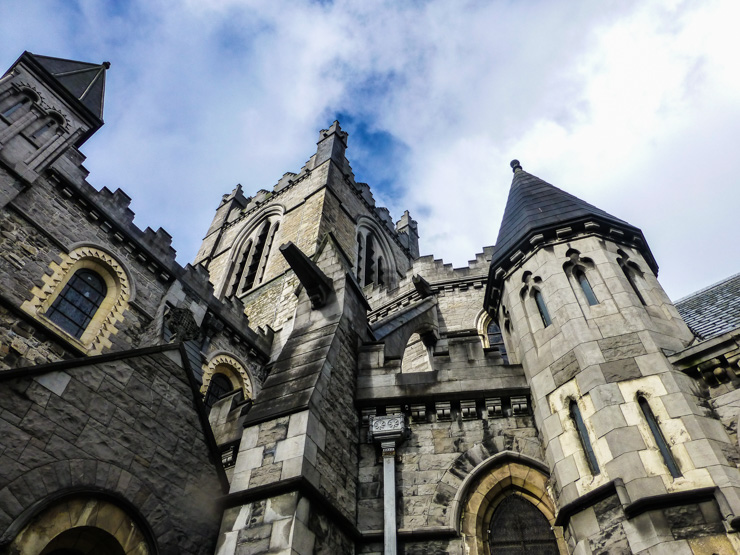
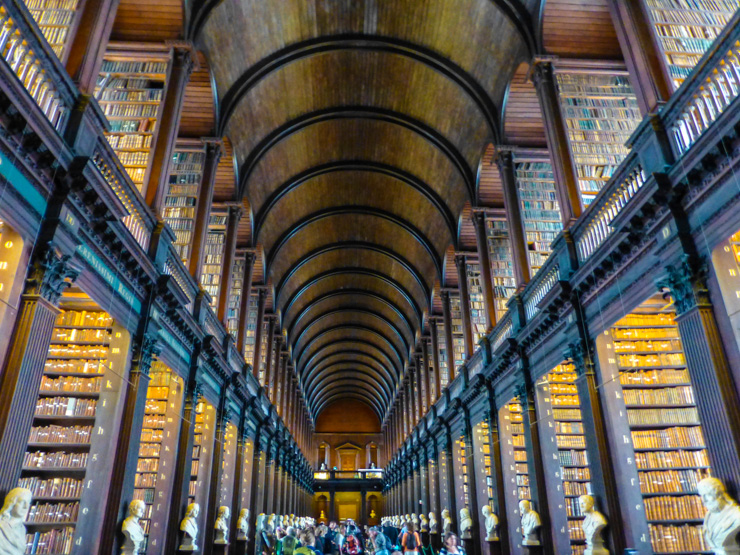
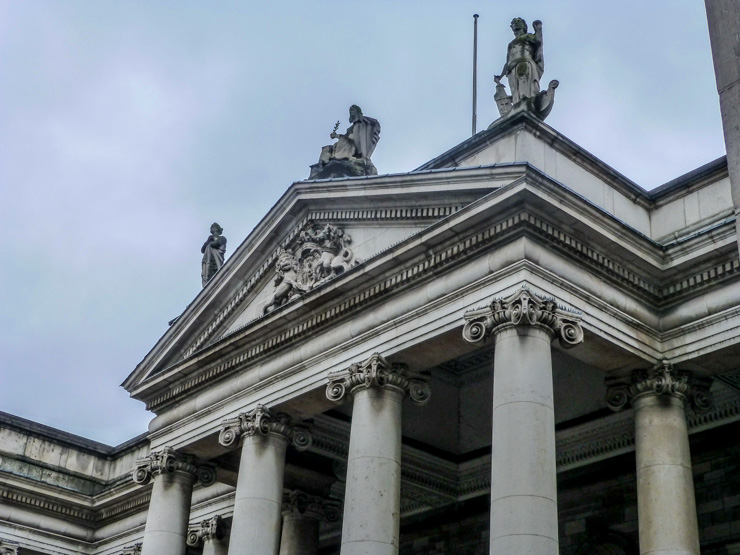
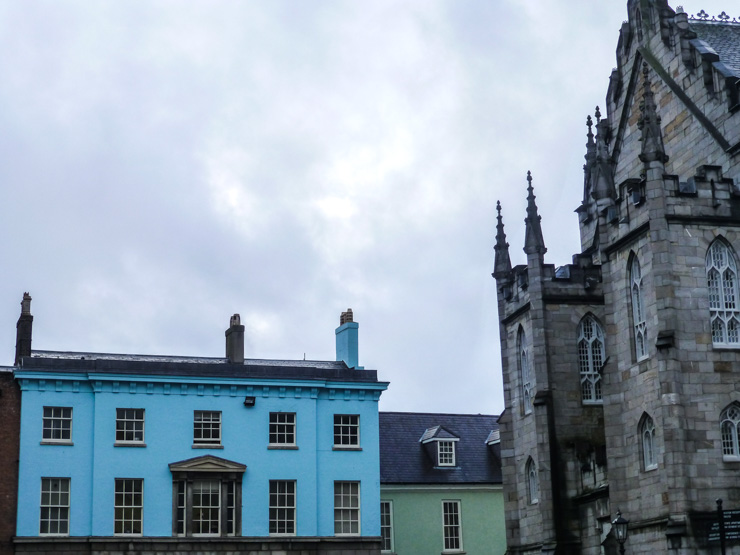
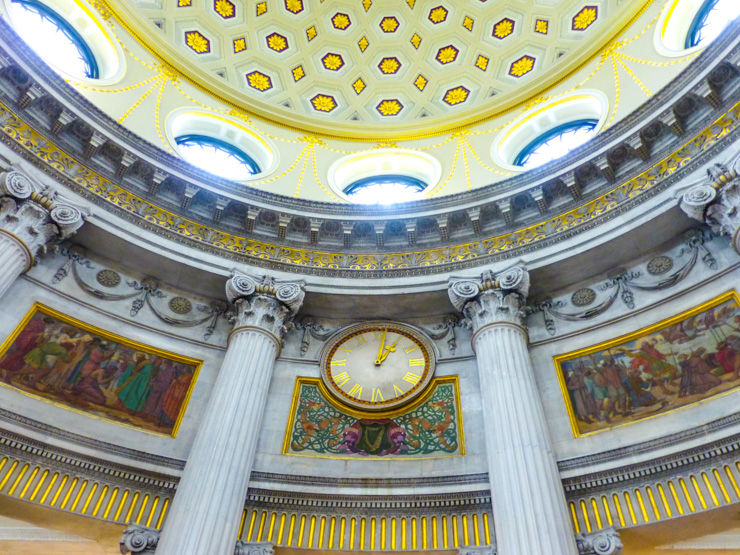
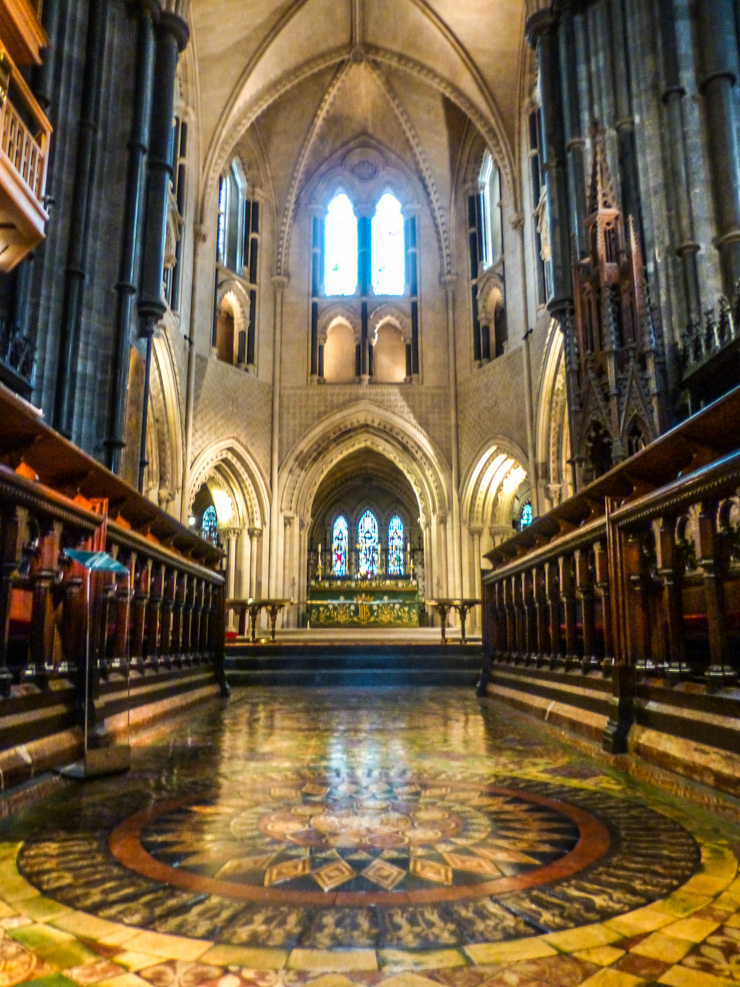
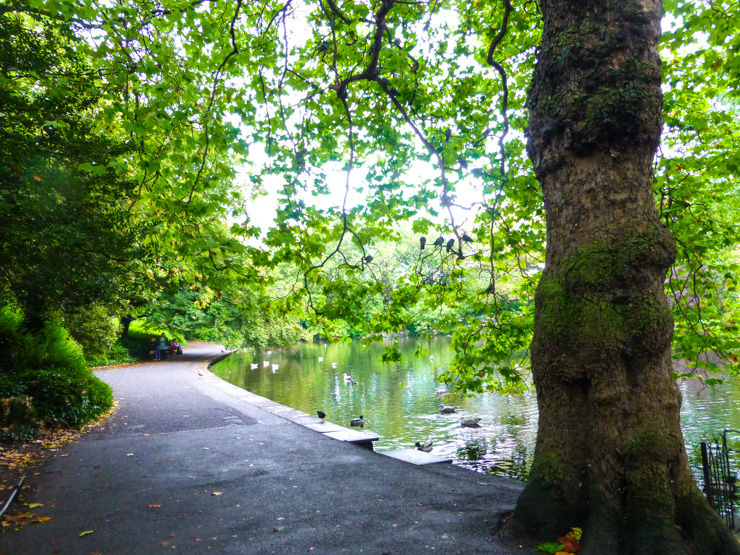
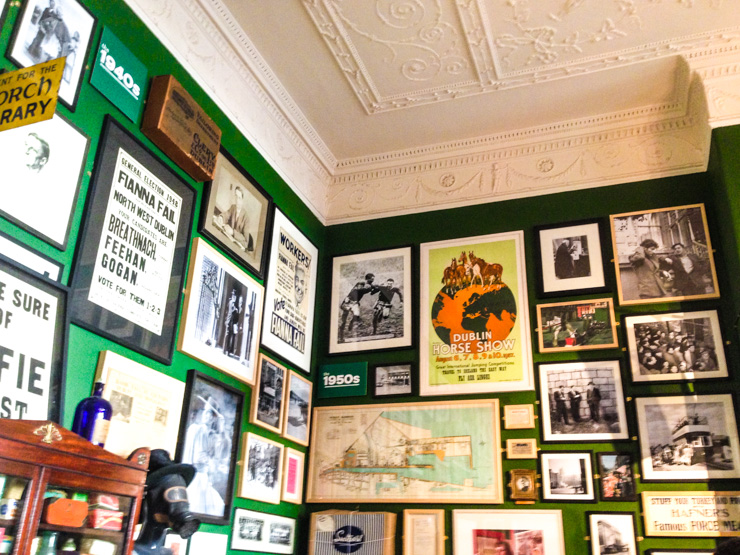
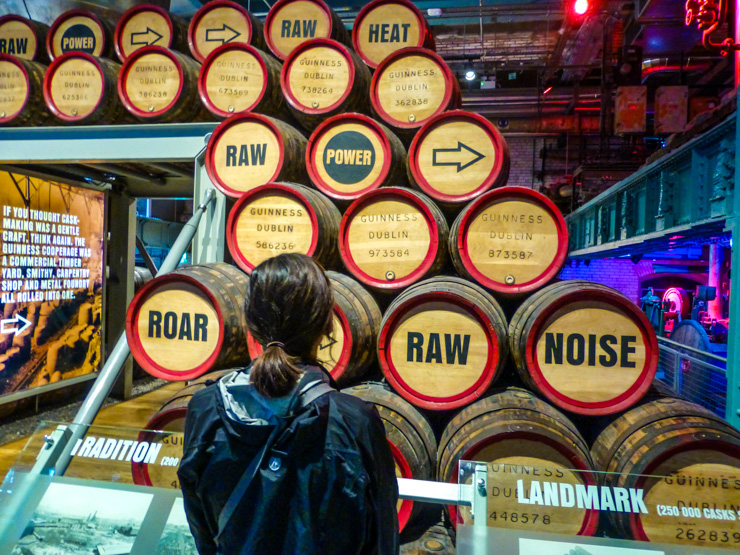
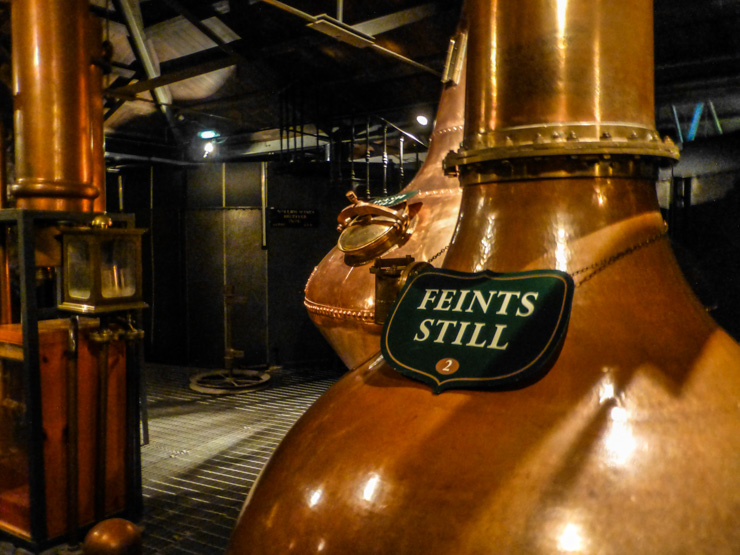
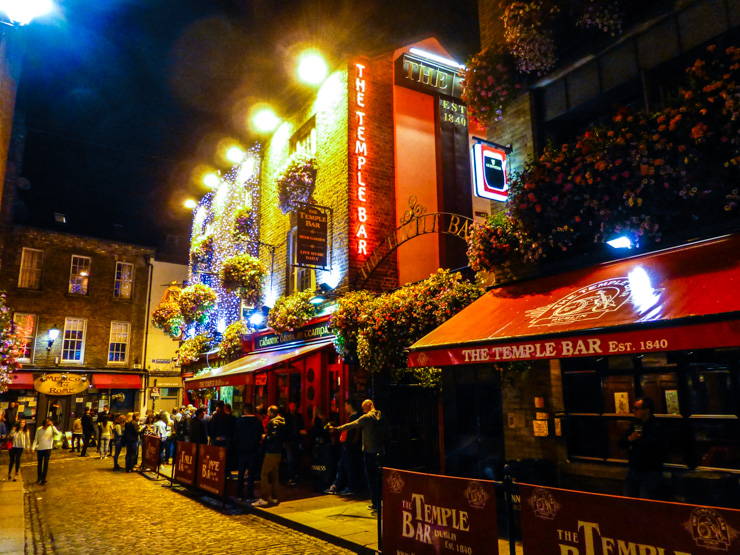
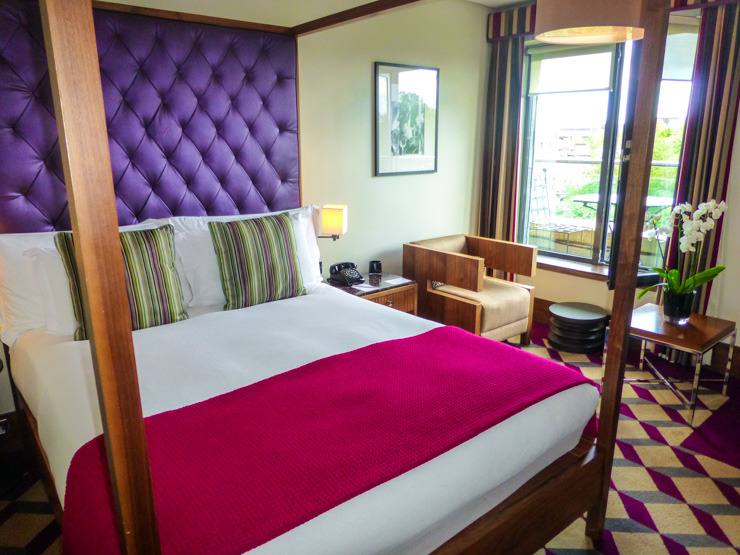
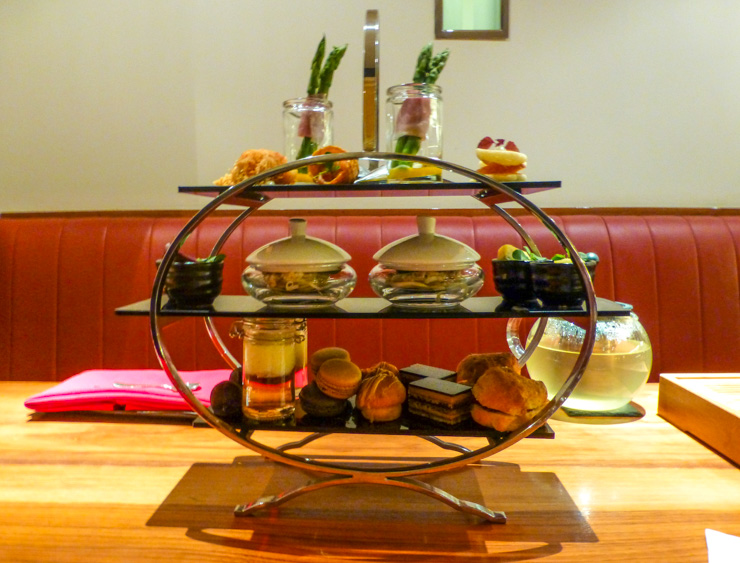
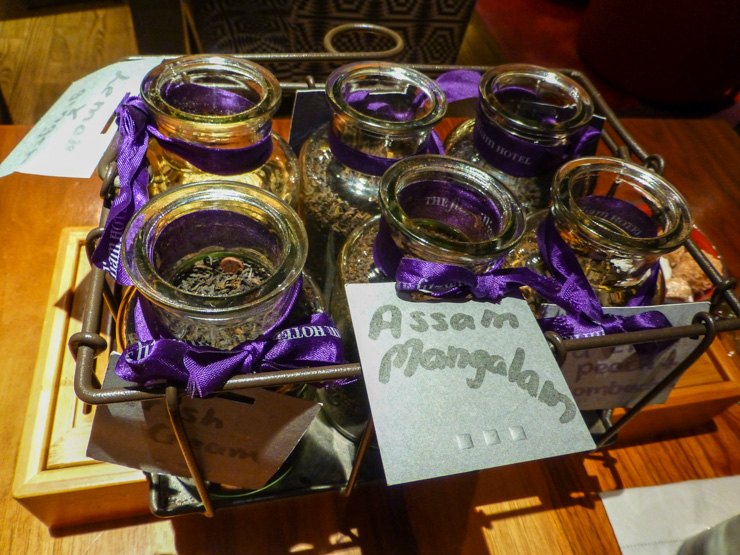
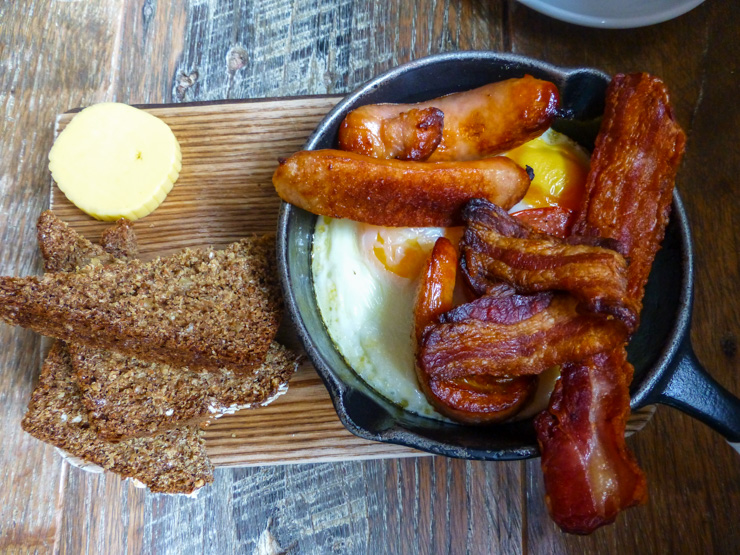
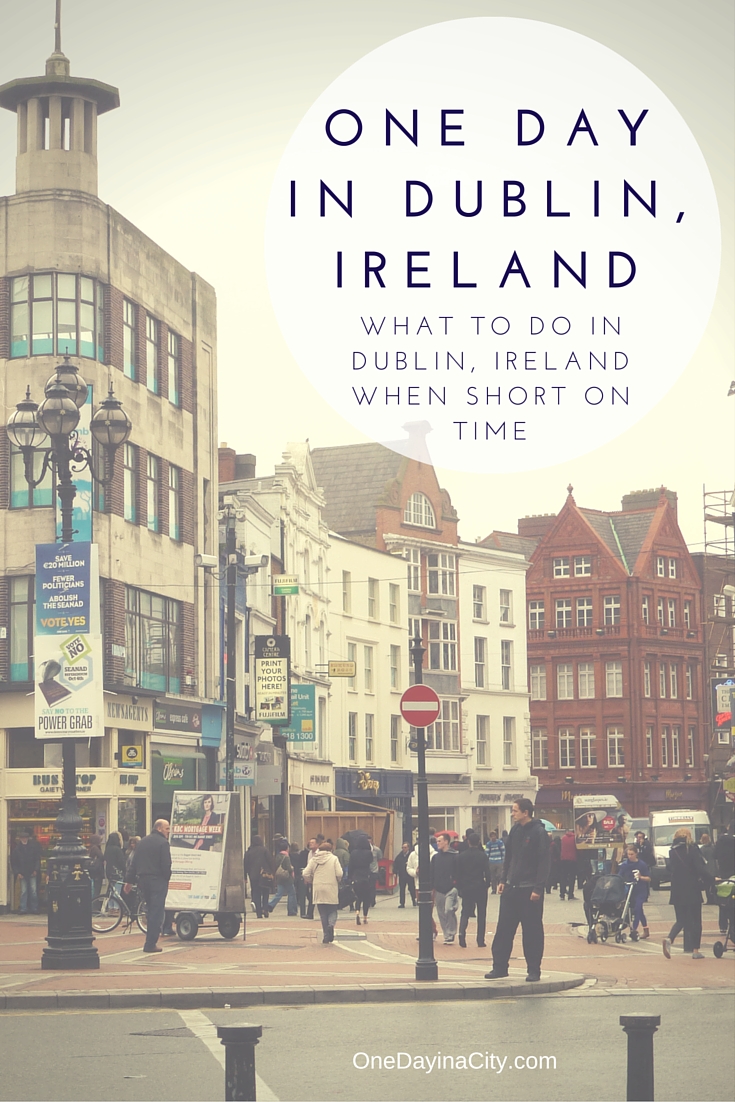
Also good sites to visit, though you may need two days then! 🙂
Not to forget the Dublin Zoo, St Patrick’s Cathedral & the Kilmainham Gaol ????
Glad you found it helpful! Have fun in Dublin! It’s a great city.
I will have more than a day in Dublin. But this list is a great source for fund things to do. Thanks for sharing 🙂
How fun! I’d love to live in Ireland for awhile someday!
I spent six months living in Dublin and have some very happy memories there, such a fun city!